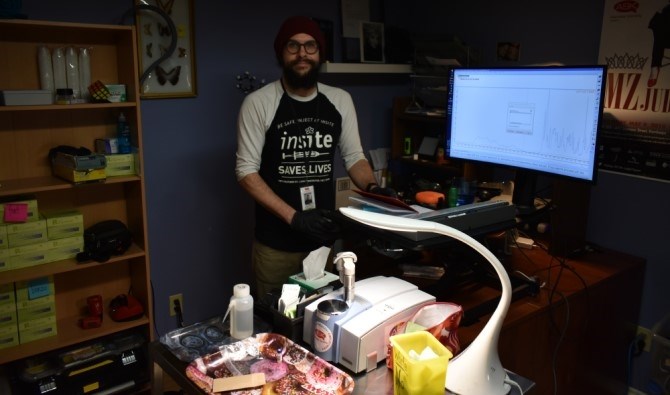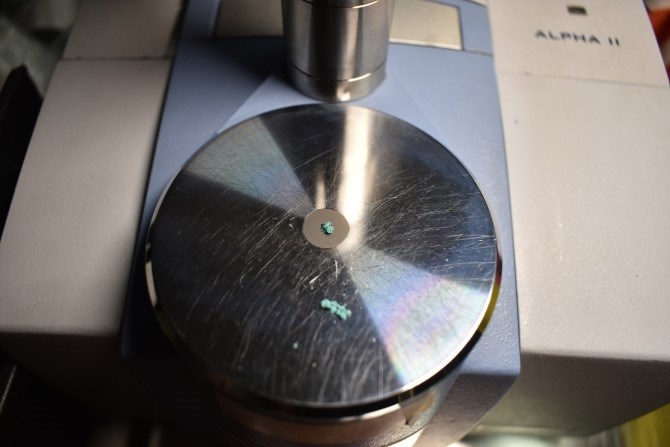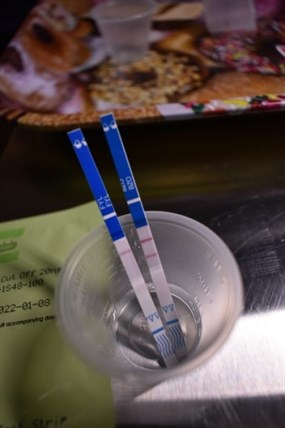
Kile McKenna tests drugs for people in Kamloops and Merritt. If you see the Interior Health drug alerts in those cities, you can bet he tested it.
(LEVI LANDRY / iNFOnews.ca)
March 14, 2021 - 7:00 AM
Kile McKenna sits in a basement office at ASK Wellness on Tranquille Road doing something he never thought he’d be doing.
He scoops out a small amount of drugs from a small plastic cup. He’s not taking them, he’s going to make sure someone else can.
On a small table, an LED lamp brightens the testing equipment. All he needs is sterile lab equipment, like a spatula, wipes, cups and distilled water; but his most important tools are a spectrometer and test strips.
In the small plastic cup, about the size of a shot glass, a match head amount of a mysterious blue powder is waiting to be tested. McKenna removes some with his spatula and scrapes it atop the spectrometer.
A micro-sized sample is laid on the spectrometer where the “anvil” secures the powder from above. He clamps the anvil down, like pressing a coffee pod into a Keurig. Now, the substances can be identified by an infrared light that passes through a synthetic diamond onto the powder.
He'll have the results in about 10 minutes.
McKenna unexpectedly found himself on the front lines of the opioid crisis, saving lives. It wasn’t what he expected to be doing with his environmental chemistry degree.
“Originally, I figured I’d be here for a year or two,” McKenna says. “But I’ve seen the way (the opioid epidemic) affects people on the ground and I've realized that stigma is a much more pervasive issue than I ever would have been able to imagine before. I’ve had to come face-to-face with some of my own biases too."
He's not into the drug scene himself, but he’s learned enough to know how important this little lab — and the work he does — really is.
“I don’t see myself getting out anytime soon.”
Finding someone to check illicit drugs in B.C. is more difficult than you’d expect. In the entire Interior Health region, ASK Wellness is one of only a few organizations to offer the service, which they do on Kamloops's North Shore and once a week in Merritt.
If you Google search "drug testing" or "drug checking," most results are for employers who wish to test their employees. But if you navigate health authority websites or find an advocacy group, you can find a list of organizations that offer the testing service, which is supported by provincial health authorities as an effective harm reduction method.
It’s a job that aims to keep people safer in a drug market that is increasingly dangerous and continues to take lives at an accelerating rate.
As ASK Wellness's resident drug technician, he's kind of an add-on. The organization focuses most of its resources on housing, but McKenna keeps going with the resources he has available. Whenever there is a dangerous drug alert from Interior Health in Kamloops or Merritt, he tested it.

(LEVI LANDRY / iNFOnews.ca)
The Fourier-Transform Infrared Spectrometer, or FTIR, measures how light at different wavelengths interacts with a substance. That information is then translated into waves on a graph, which can be used to determine what that substance is. Each substance will show different peaks and valleys which are compared in a database to determine which substances are present in the sample.
McKenna says it's similar to checking fingerprints in a database.
"If you have just one print and a whole database, software can easily match that up,” he said. “If you have two fingerprints it might be harder to pick out, but decent software can see maybe 60% of one print and 40% of another. As you stack more in the same surface, or more substances in the sample, it can get more and more difficult to determine."
READ MORE: Opioid mixtures make toxic drug supply even more dangerous in the Interior

(LEVI LANDRY / iNFOnews.ca)
Street drugs are rarely a pure substance, and even prescription drugs have a variety of fillers that can make it difficult to accurately determine the makeup. The blue substance was sold as ‘down’, a street term for an opioid. After the spectrometer test, McKenna determined three likely substances mixed in; Fentanyl, caffeine— a common cutting agent in fentanyl— and a sugar substitute called xylitol.
That’s why the test strips are important.
A spectrometer can also determine the potency of a substance, but when results are more muddied, or fentanyl traces are below 5%, McKenna can mix a small amount of a substance with water in a cup and drop in two test strips. One will test for fentanyl, the other strip is for benzodiazepines. Two lines are negative, one is positive.
READ MORE: Drug decriminalization isn't radical, it's already here in the Thompson-Okanagan
After the spectrometer test, he mixes the sample with water and places two strips in the cup. It's the final test to confirm fentanyl and benzodiazepines in the drugs.

(LEVI LANDRY / iNFOnews.ca)
Now he can contact the person that dropped off the sample with ASK Wellness. He'll let them know what's in the powder, but what they choose to do with it is up to them.
Users don’t expect to find ‘pure’ on the streets anymore, but it’s a relatively safe sample. The strip tests confirmed it has fentanyl, but negative for benzodiazepines — a good sign because 'benzos' are one of a few additives frequently prevalent in an increasingly toxic drug supply. They counteract the effects of naloxone, which can reverse an overdose.
Drug checking has been encouraged by the B.C. Ministry of Health since 2016. They have a strong partnership with Interior Health, and McKenna says he has absolutely no concerns about being arrested or harassed by police for what they do. Police in B.C. very rarely pursue simple possession charges anymore, anyway.
While drug checking outfits have support from health authorities, they don't receive funding from health authorities for what they do. The COVID-19 pandemic has overshadowed the overdose crisis, but McKenna expects to see meaningful action soon. He hopes to see the overdose death toll drop again once COVID-19 vaccines rollout. He also cites recent discussions at municipal and provincial governments calling for drug decriminalization, an idea circulating provincial government since at least May.
"With COVID-19, it's easy to see the direct effects that it has on everyone. And now, you can’t turn on your radio or TV without hearing about vaccinations; the different schedules, different types. Whereas with the opioid crisis, it continues to be bad news after bad news, making it difficult to keep up engagement."
READ MORE: Kamloops's top cop calls for safe drug supply
Yet he stays hopeful that harm reduction works.
After receiving his undergrad at TRU in environmental chemistry, he’s glad that he’s been able to utilize the clinical aspects of his chemistry background and merge it with a sense of understanding towards those needing the service.
"I think the sweet spot is somewhere in the middle — the future of working in the opioid crisis is integrating those technical aspects with lived experiences in a much more meaningful way than we've been able to do it up to now."
The ASK Wellness building at 433 Tranquille Road accepts drug samples for testing from Monday to Friday between 8:30 a.m. and 4:30 p.m. They also offer people to take Naloxone kits and fentanyl test strips with them. Just knock on the red door at the back of the building.
Throughout the Okanagan, UBCO is currently offering drug tests until the end of March, according to a recent press release. For the next few weeks, they will offer the tests at the campus and downtown Kelowna on Wednesdays, Vernon on Tuesdays and Penticton each Saturday.
See here for full list of drug checking services within the Interior Health region.
To contact a reporter for this story, email Levi Landry or call 250-819-3723 or email the editor. You can also submit photos, videos or news tips to the newsroom and be entered to win a monthly prize draw.
We welcome your comments and opinions on our stories but play nice. We won't censor or delete comments unless they contain off-topic statements or links, unnecessary vulgarity, false facts, spam or obviously fake profiles. If you have any concerns about what you see in comments, email the editor in the link above.
News from © iNFOnews, 2021